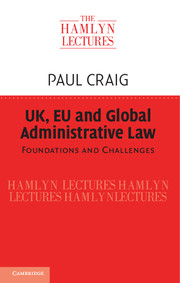Book contents
4 - EU administrative law: challenges
Published online by Cambridge University Press: 05 November 2015
Summary
1 Introduction
The previous chapter considered the foundations of EU administrative law, and this chapter addresses the principal challenges that it faces, some of which are horizontal, in the sense of internal to the regime of EU administrative law, while others are vertical in nature, flowing from the interplay between EU law and national administrative law or global administrative law.
The discussion begins with the caseload problems that beset the EU courts. In the past the discourse on this issue has been directed principally towards the ECJ, with concerns about its capacity to cope with the increase in the number of preliminary references. More recently it has been the General Court that has been most problematic in this regard, which is of particular importance for EU administrative law given that it has jurisdiction over direct actions for judicial review. The sources of the caseload problem are examined, the implications that this has for EU administrative law are explored and the proposed solutions are scrutinized.
The discussion then turns to process and the challenges that EU administrative law faces in this regard. The EU courts have achieved much in this area, especially in relation to process rights that relate to individualized adjudication. Their jurisprudence crafted on general principles of law and fundamental rights has ensured protection for the right to be heard and the more general rights of the defence. The EU courts have, however, faced difficulties flowing from initiatives to tackle terrorism post-9/11, more especially in the form of legal challenges to asset-freezing orders imposed by the EU pursuant to decisions made by the UN. The infirmities of due process at the UN level prompted legal challenges to the EU regulations. This in turn has forced the courts to articulate how the right to be heard can be balanced against the needs of security. The remainder of the discussion on process considers the possibility of a general law or set of model rules on administrative procedure, which would be applicable not merely to individualized adjudication, but also to rule making, public contracts, mutual assistance between national administrations, and data transfers. It will be argued that model rules of this nature are desirable and that concerns about such a development are misplaced.
- Type
- Chapter
- Information
- UK, EU and Global Administrative LawFoundations and Challenges, pp. 419 - 565Publisher: Cambridge University PressPrint publication year: 2015



